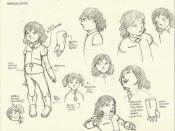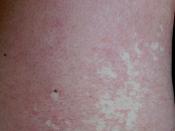Feminist View of Aylmer
By the end of the eighteenth century, science had found its way into the advancement of humankind in the realm of medicine. Men believed they could cure and save all creatures on earth from their flaws and defects. Aylmer in Nathaniel Hawthorne's "The Birthmark" is one such character. Aylmer is a scientist who strives for perfection, so much so he believes his newly wed wife, Georgiana, would be the "ideal loveliness" if her birthmark were removed. Stacy Tartar Esch believes the birthmark in the short story is the symbol men's incapability to accept women as their equals. Instead, men need an ideal vision of what they believe a woman should be; men need to feel that their woman is his ideal. A woman is neither a woman nor a person but an object that can be fixed into men's ideal. The woman is void of her "actual humanity" and is no longer human (Tatar Esch, link 14).
The ideal vision for Aylmer is Georgiana without her crimson colored mark that lies upon her cheek. He sees Georgiana's mark as a flaw of nature's hand and if it were removed then she would be the perfect woman. Aylmer's distain for the mark becomes more apparent because he sees "it as the symbol of his wife's liability to sin, sorrow, decay, and death" (Hawthorne 170). This mark creates a world of pain for Aylmer; he cannot go beyond looking at her appearance. Aylmer looks at his wife and sees the hand that taints her soul. Aylmer is the typical male; he believes he can fix anything even his poor wife. He can solve her problems and take on the task of removing her mark. Aylmer would be considered a genius if he can remove the "crimson...


